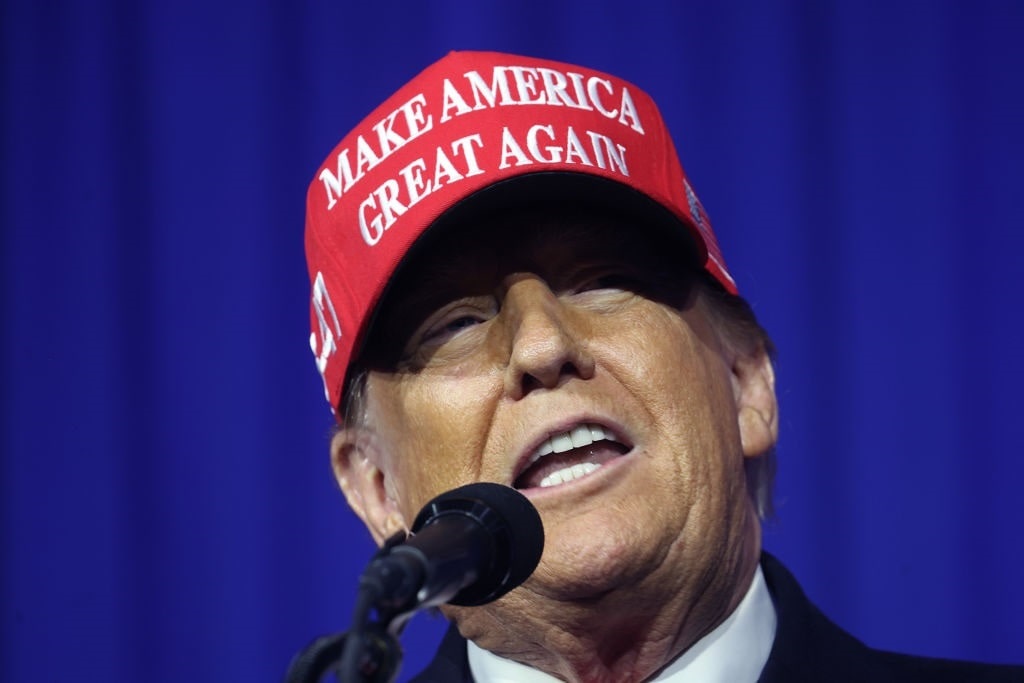Donald Trump is too busy appearing in court and making his way through the early primary states to be glad-handing, photobombing, kissing babies, and scheduling his giant patented rallies across the nation. But it’s an election year: What’s a crafty presidential candidate to do? Well, he’s beginning to call it in. Election 2024, whether Americans like it or not, is not embracing the good old days of campaign buttons and collectibles, door-to-door canvassing, and phone banks from local headquarters and diehard volunteers. Now, there are live phone calls to the masses.
Donald Trump on Line One
It’s so simple, and it is brilliant: Schedule a phone call to a preplanned event, call in randomly to speak to the crowd, and they go wild. Conservative and MAGA celebrity onstage events are a prime resource. Trump has called in to his former National Security Advisor Michael Flynn’s ReAwaken America Tour, where he energized 3,000 folks united in Christ – as they claim – to bring America back to a Godlier country. He tapped in to his Housing and Urban Development Secretary Ben Carson’s speech at the Pennsylvania state committee GOP dinner. As spokesperson Steven Cheung told Axios: “People can’t get enough of [Trump], even if it’s spurts of him.”
 As Trump knows, every audience has a button waiting to be pushed. Each call appears spontaneous, but prep time is critical in today’s tech world. Trump needs names, people who have committed to the event, and the general flair of the attendees. An audience full of factory workers is geared toward manufacturing, whereas the soccer mom event talks about empowerment and education. And can one imagine the topic of the former president’s call to a Kari Lake event in McAllen, TX, for the annual Reagan Dinner?
As Trump knows, every audience has a button waiting to be pushed. Each call appears spontaneous, but prep time is critical in today’s tech world. Trump needs names, people who have committed to the event, and the general flair of the attendees. An audience full of factory workers is geared toward manufacturing, whereas the soccer mom event talks about empowerment and education. And can one imagine the topic of the former president’s call to a Kari Lake event in McAllen, TX, for the annual Reagan Dinner?
Here’s the genius of it all: Trump is not spending precious campaign coffers on this new style. Two staffers, one on both ends of the call that lasts just minutes, and, by crikey, you have personally touched and rallied thousands of the faithful.
It’s so good even Biden has attempted to dial it in, though it didn’t go so well for him. Considering the man won an election in 2020 from his downstairs den, he should be a level expert in the process.
After handily winning the South Carolina Democratic Party presidential primary, Joe dialed his phone. The recipient was Rep. Jim Clyburn (D-SC). It went horribly wrong, which would be the kindest way of explaining what happened next. Clyburn held the phone to the podium mic and then assistants got involved and there was feedback. Finally, the president muttered, “What kind of turnout did you get there?” He earned a smattering of applause. But Trump’s calls have electrified the GOP voters whenever they hear his live message.
The current president’s South Carolina call was not pre-planned, and it dulled the congratulatory buzz that the crowd was enjoying. Handlers no doubt will improve at this tactic, despite clearly starting at a deficit. Remember, while Trump held mega rallies, Biden campaigned from his Delaware basement and still harpooned the big whale.
Change – Adapt – Connect
It’s no secret that Trump has revolutionized how the two dominant political parties campaign for president. Since he rode down the golden escalator at Trump Tower to announce his “maybe I will finally” candidacy, he has embraced his new predicament and found a workaround. Biden must play up his humorous and affable role because he is a bit challenged in the tech department. Seems like a self-effacing and aw-shucks attitude may be the ticket this time around.
The high-stakes game of politics is never stale or stagnant, and campaign and candidate visionaries always seek the newest ways to talk to voters. Whistle-stop campaigns rolling down the rails, beginning with William Henry Harrison in 1836, gave people in rural areas more opportunities to see presidential candidates. Decades later, Theodore Roosevelt electrified rural communities with high-energy appearances.
In 1896, William McKinley ran his front porch campaign from his home in Canton, OH, which drew crowds that, over time, ballooned to about 700,000 constituents. Biden embraced the strategy during the pandemic. Harry S. Truman, somewhat lacking in personality, reached a small audience during railway campaigning in the summer and fall of 1948. Marilyn Harlan in Pacific Junction, IA, claimed after the visit: “Everyone in town and others from the surrounding area came to see the man who thought we were important enough to address.” Connection.
Franklin Delano Roosevelt used the radio and fireside chats to talk with folks as if in their own parlor, John F. Kennedy appeared in everyone’s living room on television, and Bill Clinton put his approachable personality center stage – they all found ways to use any medium that made voters feel like someone was listening to them individually.
Both Trump and Biden can benefit greatly from phone-ins with the electorate. It saves time and a whole gob of campaign cash, while still ensuring every voter gets a clear and personal message.




